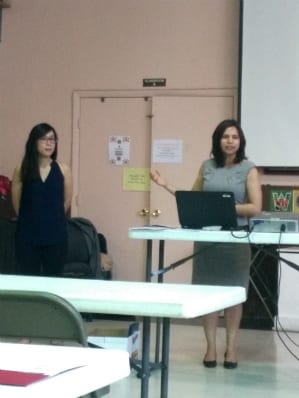
June 14, 2017
Legal aid attorneys train social service providers in SNAP benefits
WORCESTER, Mass.—Do you qualify for SNAP benefits (known as “food stamps”)? What if you’re a student living with your parents? What if you have a roommate you split grocery bills with? Or maybe you buy your own groceries, but cook together? What information do you need to prove who you are?
Questions like this can be vexing, and not only for individuals who are experiencing financial hardship and applying for benefits. Sometimes these questions confuse even the people whose job it is to help you fill out your application.
To better equip frontline providers to navigate the system, Community Legal Aid (CLA), the Central West Justice Center (CWJC), and the Worcester County Food Bank provide “SNAP trainings for advocates,” the most recent of which was held June 13 at the Loaves and Fishes Food Pantry, located in the Unitarian Universalist Church on Holden Street in Worcester.
At the training, about ten Worcester area organizations were represented, in addition to the sponsors.
Attorneys Janet Vo of CLA and Gina Plata-Nino of CWJC led the training, which included a general overview of the SNAP program and application process, as well as discussions on maximizing benefits for older adults, parents with children, and the disabled; the rights of non-English speaking clients; and when it is necessary to call a legal aid agency.
Plata-Nino emphasized that the legal aid agencies hope to stop unfair denials of benefits both at the individual and statewide levels. According to her, sometimes when legal aid gets involved in a case, a conversation with the Department of Transitional Assistance (DTA), which oversees the SNAP program in Massachusetts, takes place. The DTA will then often take measures to ensure that the problem is remedied across the state, for example, through safe training.
Recalling a case she worked on, Plata-Nino said she once called a client who had come to CWJC because she had been unfairly denied benefits. However, “when I called, the client told me not to worry, because DTA had already called and fixed everything.” This was, as it turned out, because of an earlier case handled by CWJC.
The Worcester County Food Bank, CLA, and CWJC are part of the SNAP Coalition, which meets frequently with DTA staff, including Commissioner Jeff McCue. The meetings provide a way for the DTA and those who work with people experiencing hardship to communicate directly.
Providers should report anything that seems to be a violation a client’s rights to legal aid, Plata-Nino said. “If it’s happening to your clients, it’ll probably happen to others’ clients,” she added.
“We’ll make sure they are not denied their voice.”

















































